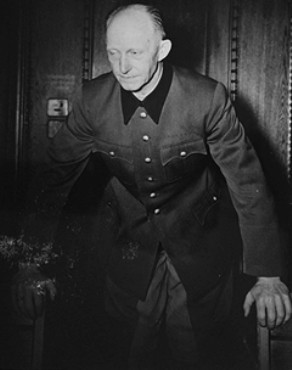
Alfred Jodl
In the immediate aftermath of the Holocaust, the world was faced with a challenge—how to hold individually accountable those German leaders who were responsible for the commission of monstrous crimes against humanity and international peace. The International Military Tribunal (IMT) held in Nuremberg, Germany, attempted to face this immense challenge. On October 18, 1945, the chief prosecutors of the IMT brought charges against 24 leading German officials, among them Alfred Jodl.
Alfred Jodl (1890–1946) was Chief of the Armed Forces High Command Operations Staff. In this capacity Jodl directed all military campaigns and participated in planning and authorizing the brutal methods that the German Armed Forces employed while waging war.
Jodl was found guilty on all four counts (conspiracy, crimes against peace, war crimes, and crimes against humanity) and sentenced to death. He was hanged on October 16, 1946.

Critical Thinking Questions
Investigate Jodl’s life and background. What choices did he make as he rose to prominence and authority?
Across Europe, the Nazis found countless willing helpers who collaborated or were complicit in their crimes. What motives and pressures led so many individuals to persecute, to murder, or to abandon their fellow human beings?

